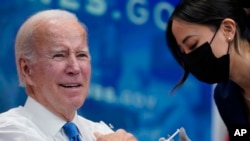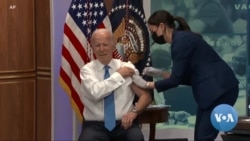President Joe Biden got his fourth COVID-19 shot Tuesday and urged all Americans to do the same, as White House officials urged Congress to approve their request for $22 billion to fund U.S. and global COVID response.
"We're here with a simple message: Get vaccinated," Biden said, before rolling up his left sleeve to receive his booster shot.
Biden also castigated members of Congress who, he said, "want to move beyond COVID, but they don't want to spend the money to do it."
"We can't have it both ways," he said. "The funding we seek is critical to continue the work to develop and purchase the most effective treatments and vaccines against COVID."
Among those funds, requested in September, is $4 billion for global assistance in vaccination, therapeutics and diagnostics.
That money hangs in the balance in this deeply divided legislature, where Republicans have criticized and opposed Biden's COVID funding requests.
Senate Republicans have signaled discontent about the amount being requested for the COVID funding. They contend that federal spending on the virus needs to be ending, not increasing. Missouri Sen. Roy Blunt, a member of the Republican leadership team, said people can pay for their own vaccines just as they do for parts of their health care.
And most GOP lawmakers are sticking with the view that dedicating more money to the country’s COVID response should be paid for by cutting spending elsewhere.
The White House's top COVID-19 coordinator said global demand for vaccines has declined – and the White House told VOA that the U.S. has delivered about 600 million doses of its pledged donations. He urged Americans to support continued global assistance.
"Beyond self-interest, you know, America is a country that is deeply engaged in the world," Dr. Ashish Jha said. "The president has restored American leadership on global health in a way that was very different than the previous president. And so, for a whole set of reasons it's very, very important that America continue to lead. $4 billion is a small investment to make to better protect Americans and better protect the world."
Health experts agree.
"The end is really palpable," Dr. Krishna Udayakumar, director of the Duke Global Health Innovation Center, told VOA via Skype. "But if we don't take the right steps now, we're really at risk of going backwards instead of forwards. We need to make sure that we're still committing additional dollars, including the funding that's been requested as supplemental aid to make sure that the global response can continue."
Udayakumar added that the nature of the response needs to evolve along with the pandemic, which is in a different stage now than two years ago.
"There's very little we need to do right now to purchase more vaccines, we actually have purchased more than is needed, we now need to make sure we're turning vaccines into vaccinations to actually get shots in arms," Udayakumar said.
"In addition, we do need to purchase more of the oral antivirals because very few of those have been purchased for use outside the U.S. And we also have to invest in building the capacity in the health systems that need it so that patients can actually get tested and get access to treatments that will hopefully prevent severe disease, prevent hospitalizations and prevent deaths."
But whether that gets funded depends on elected officials. Voters head to the polls in coming weeks to fill all 435 seats in the House of Representatives, and 35 of the nation's 100 Senate seats.
VOA's Patsy Widakuswara contributed to this report.








